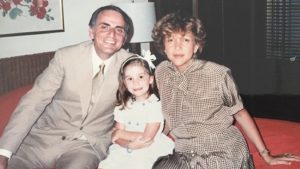If, while spending all day and night sheltered at home with your children, you’re wondering what impact your omnipresence might have on their lives, consider what it was like for Sasha, whose parents were Carl Sagan and Ann Druyan. The following is from Sasha Sagan’s book, “For Small Creatures Such As We.”
The discussions that fueled my parents’ workdays flowed over into dinnertime, and that enriched me enormously. They managed to explain even the most complicated concepts clearly and without ever talking down to me, with a kind of gentle intellectual respect, as though I was some kind of tiny professor trapped in a little girl’s body. I think it’s this same skill that made their work accessible to so many non-scientists around the world.
During those dinnertime discussions the greatest thing I could do, in the eyes of my parents, was to ask a question to which they did not know the answer. To them it was the sign of a curious intellect scanning the horizon for new mysteries, which might lead to new understanding. I never once got a “That’s just how it is,” or a “Because I said so.”
Instead, my father would, smiling, retrieve a volume of our brown and green Encyclopedia Britannica from above our sort of kitschy, 3-D, glass-and-neon painted model of the Milky Way galaxy. Together we would look up the answer and revel in a shared clarity.
For many, reading passages from their holy text offers daily enlightenment and answers to the endless questions that run through our minds. For us, it was the encyclopedia, atlases, and dictionaries. And like finding a new verse in a sacred book, or reading an old one with fresh eyes, this enriched me emotionally, not just intellectually. Every day I gained a deeper sense of the workings of the world and the universe. Every day I got a little closer to a sense of understanding. Learning to draw connections thrilled me. It made the world less overwhelming. I felt more confident, braver. The more I learned about history, the more I understood about geography. The more I knew about etymology, the more Latin I could piece together. In those days, every encyclopedia entry I read felt like it was snapping in a new puzzle piece. I thought I might soon see the entire picture.
But as I grew, I realized the puzzle had no edges, no borders. It went on forever in all directions. Every new piece just revealed how many more pieces were still missing.

